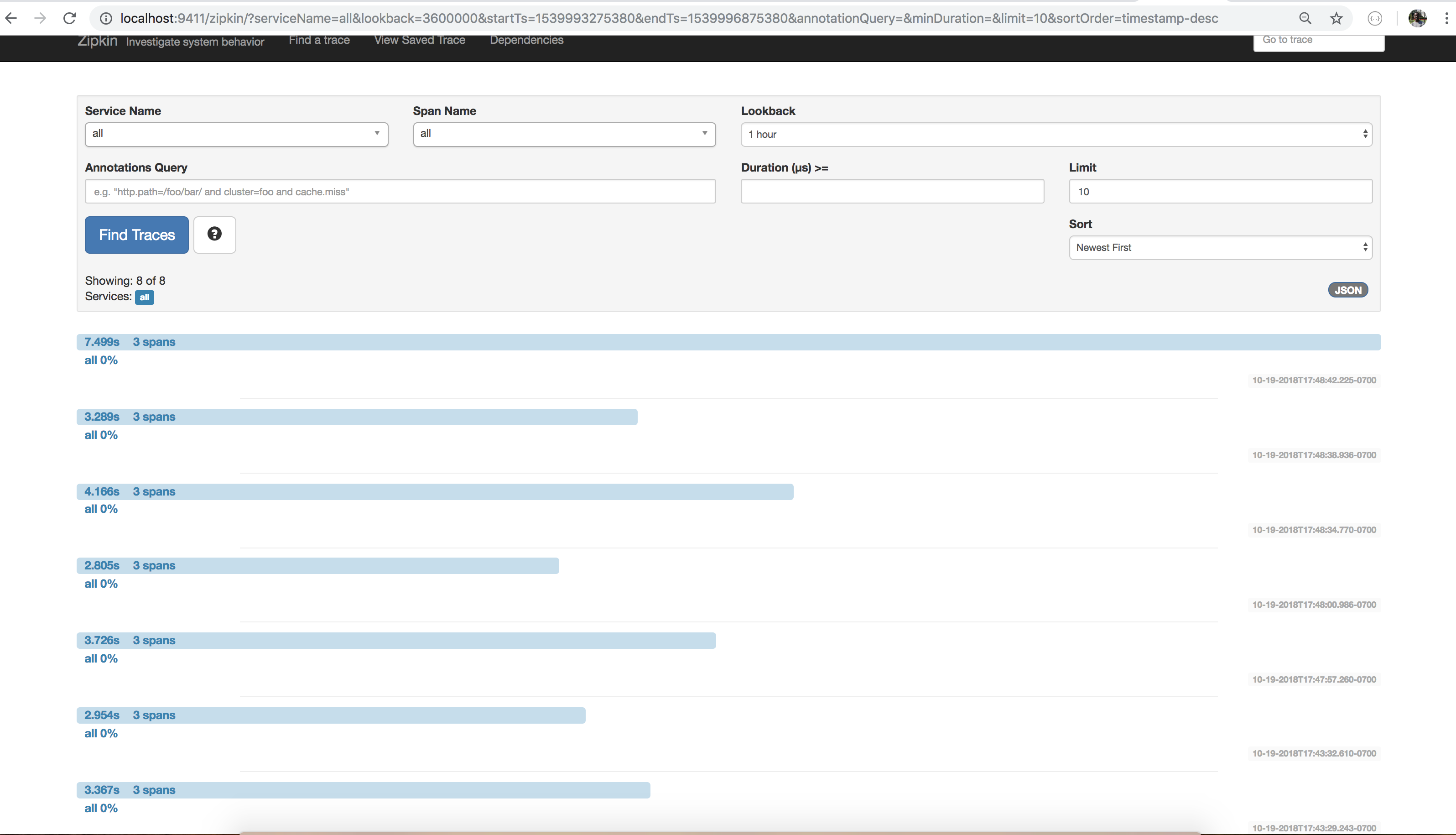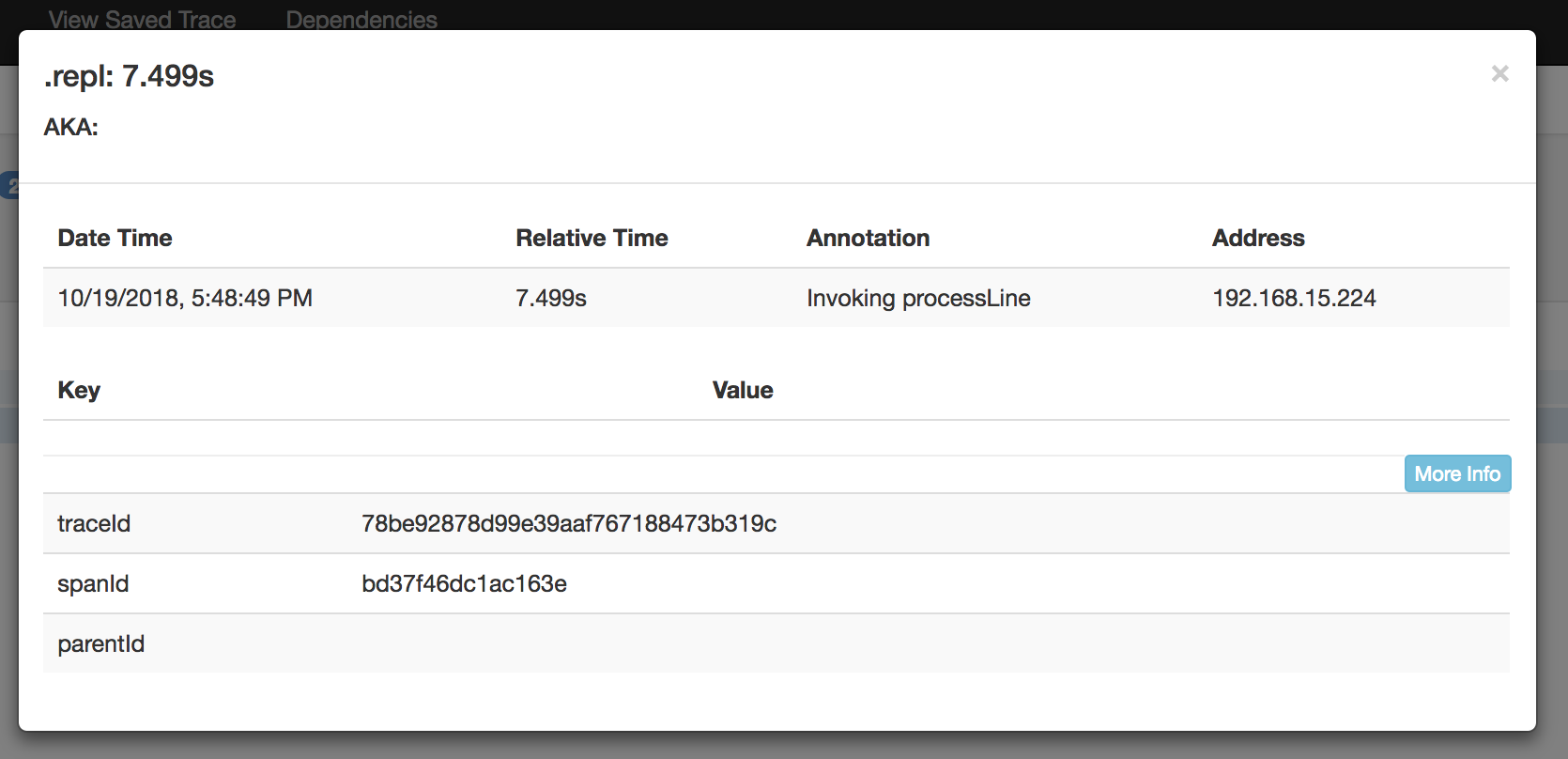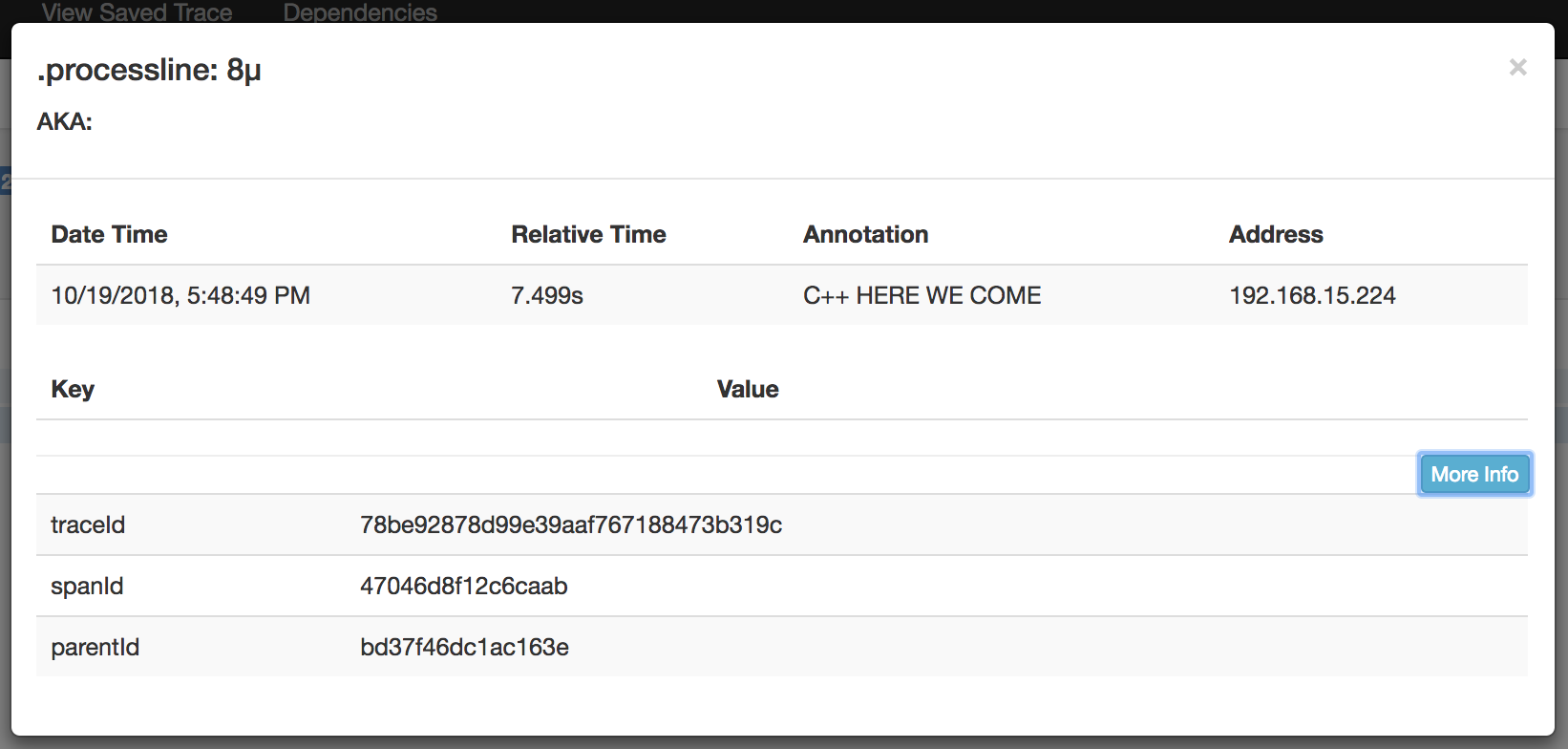Tracing
- Requirements
- Brief Overview
- Getting started
- Enable tracing
- Enable exporting
- End to end code
- Viewing your traces on Zipkin
- References
In this quickstart, we’ll learn how to:
- Add tracing to our application
- Enabling an exporter to our C++ application
Requirements
Brief overview
By the end of this tutorial, we would have done these two things using OpenCensus:
- Learn how to add traces to our applications
- Learn how to extract traces and export them to a backend of our choice
Getting started
Our application is an interactive commandline application that:
- accepts input from standard input
- capitalizes the input
- prints out the capitalized data to standard output
To get started, we’ll create a file tracing.cc
#include <iostream>
std::string capitalize(std::string in) {
std::string out(in);
for (auto it = out.begin(); it != out.end(); it++)
*it = std::toupper(*it);
return out;
}
int main(int argc, char **argv) {
while (1) {
std::cout << "\n> ";
std::string input;
std::getline(std::cin, input);
std::string upper = capitalize(input);
std::cout << "< " << upper << std::endl;
}
}and to run it, we’ll use this command
g++ -std=c++11 tracing.cc -o tracing && ./tracingwhich will produce output such as:
> bigger than this
< BIGGER THAN THIS
> this is the quickstart
< THIS IS THE QUICKSTART
> introductions
< INTRODUCTIONS
>With the application running, we might want to know:
a) How do the parts of the program coordinate? b) How long do the various parts take?
To answer the above questions, please read along:
Enable tracing
Build system
To enable tracing, we’ll need to use the OpenCensus C++ library. The library requires the Bazel build system
For assistance setting up Bazel Build, please click here
Please install bazel first. After that, please proceed below.
To add tracing with OpenCensus, firstly we’ll need to use Bazel build to setup a couple of imports for:
After installing bazel, we’ll need to make two files in the same working directory as the tracing.cc
that is:
- WORKSPACE
- BUILD
WORKSPACE
Please update your WORKSPACE file to:
http_archive(
name = "io_opencensus_cpp",
strip_prefix = "opencensus-cpp-master",
urls = ["https://github.com/census-instrumentation/opencensus-cpp/archive/master.zip"],
)
# OpenCensus depends on Abseil so we have to explicitly to pull it in.
# This is how diamond dependencies are prevented.
http_archive(
name = "com_google_absl",
strip_prefix = "abseil-cpp-master",
urls = ["https://github.com/abseil/abseil-cpp/archive/master.zip"]
)http_archive tells bazel to configure an “external repository” by downloading an archive via http, unpacking it, and removing the top-level directory as per “strip_prefix”
BUILD
Please update your BUILD file to:
cc_binary(
name = "tracing",
srcs = ["tracing.cc"],
linkopts = ["-pthread"],
deps = [
"@com_google_absl//absl/time",
"@io_opencensus_cpp//opencensus/trace:trace",
],
)- “deps” is a list of libraries that our binary depends on. Alongside linking these libraries, bazel will also make their headers available to the compiler.
- ”@io_opencensus_cpp” refers to an external subrepository
- ”//opencensus/trace” is a directory path within that subdirectory
- “:trace” is the name of a “cc_library” target in that directory
From the compiler’s point of view, all of the sources and dependencies’ headers are merged into a single hierarchy i.e.
tracing.cc
absl/...
opencensus/trace/span.hInstrumenting your code
To add traces, we’ll start spans using the opencensus::trace::Span::StartSpan function
and at the end invoke opencensus::trace::Span::End on each span, e.g.:
auto span = opencensus::trace::Span::StartSpan("name", &parentSpan, {&sampler});
// Do work.
// ...
// Finally explicitly end the span.
span.End();which then fully becomes:
#include <iostream>
#include "opencensus/trace/sampler.h"
#include "opencensus/trace/span.h"
std::string processLine(const opencensus::trace::Span& parentSpan,
const std::string& in) {
auto span = opencensus::trace::Span::StartSpan("processLine", &parentSpan);
std::string out(in);
for (auto it = out.begin(); it != out.end(); it++) {
*it = std::toupper(*it);
}
// Add a custom annotation to examine later on.
span.AddAnnotation(out);
span.End();
return out;
}
int main(int argc, char** argv) {
// Samplers are potentially expensive to construct. Use one long-lived
// sampler instead of constructing one for every Span.
static opencensus::trace::AlwaysSampler sampler;
while (1) {
opencensus::trace::Span replSpan = opencensus::trace::Span::StartSpan(
"repl", /* parent = */ nullptr, {&sampler});
std::cout << "\n> ";
std::string input;
opencensus::trace::Span readLineSpan =
opencensus::trace::Span::StartSpan("readLine", &replSpan);
std::getline(std::cin, input);
readLineSpan.End();
// Let's annotate the span.
replSpan.AddAnnotation("Invoking processLine");
const std::string upper = processLine(replSpan, input);
std::cout << "< " << upper << std::endl;
// Always explicitly End() every Span.
replSpan.End();
}
}Now we’ll build it like this:
bazel build :tracingwhich will place the binary in bazel-bin/tracing
and then run it like this
./bazel-bin/tracingwhich will produce such output:
./bazel-bin/tracing
> foo
< FOO
> whip
< WHIP
> foreign
< FOREIGN
> introductions
< INTRODUCTIONS
> tracing
< TRACING
> up-to-date
< UP-TO-DATEEnable exporting
After successfully instrumenting our code, we now need to extract and visually examine those traces.
For that we’ll use Zipkin tracing
For assistance setting up Zipkin, click here for a guided codelab.
For that we’ll update both our files BUILD and WORKSPACE:
Updated BUILD file
BUILD
cc_binary(
name = "tracing",
srcs = ["tracing.cc"],
linkopts = ["-pthread"],
deps = [
"@io_opencensus_cpp//opencensus/trace",
"@io_opencensus_cpp//opencensus/exporters/trace/zipkin:zipkin_exporter",
"@com_google_absl//absl/base:core_headers",
"@com_google_absl//absl/memory",
"@com_google_absl//absl/strings",
],
)Updated WORKSPACE file
http_archive(
name = "io_opencensus_cpp",
strip_prefix = "opencensus-cpp-master",
urls = ["https://github.com/census-instrumentation/opencensus-cpp/archive/master.zip"],
)
# OpenCensus depends on Abseil so we have to explicitly to pull it in.
# This is how diamond dependencies are prevented.
http_archive(
name = "com_google_absl",
strip_prefix = "abseil-cpp-master",
urls = ["https://github.com/abseil/abseil-cpp/archive/master.zip"]
)
# Curl library used by the Zipkin exporter
http_archive(
name = "com_github_curl",
build_file_content =
"""
load("@io_opencensus_cpp//opencensus:curl.bzl", "CURL_COPTS")
package(features = ['no_copts_tokenization'])
config_setting(
name = "windows",
values = {"cpu": "x64_windows"},
visibility = [ "//visibility:private" ],
)
config_setting(
name = "osx",
values = {"cpu": "darwin"},
visibility = [ "//visibility:private" ],
)
cc_library(
name = "curl",
srcs = glob([
"lib/**/*.c",
]),
hdrs = glob([
"include/curl/*.h",
"lib/**/*.h",
]),
includes = ["include/", "lib/"],
copts = CURL_COPTS + [
"-DOS=\\"os\\"",
"-DCURL_EXTERN_SYMBOL=__attribute__((__visibility__(\\"default\\")))",
],
visibility = ["//visibility:public"],
)
""",
strip_prefix = "curl-master",
urls = ["https://github.com/curl/curl/archive/master.zip"],
)
# Rapidjson library - used by the Zipkin exporter.
http_archive(
name = "com_github_tencent_rapidjson",
build_file_content =
"""
cc_library(
name = "rapidjson",
srcs = [],
hdrs = glob([
"include/rapidjson/*.h",
"include/rapidjson/internal/*.h",
"include/rapidjson/error/*.h",
]),
includes = ["include/"],
defines = ["RAPIDJSON_HAS_STDSTRING=1",],
visibility = ["//visibility:public"],
)
""",
strip_prefix = "rapidjson-master",
urls = ["https://github.com/Tencent/rapidjson/archive/master.zip"],
)Zipkin exporter
To use the Zipkin exporter, we’ll just need these lines
#include "opencensus/exporters/trace/zipkin/zipkin_exporter.h"
int main(int argc, char **argv) {
// Initialize and enable the Zipkin trace exporter.
const absl::string_view endpoint = "http://localhost:9411/api/v2/spans";
opencensus::exporters::trace::ZipkinExporter::Register(
opencensus::exporters::trace::ZipkinExporterOptions(endpoint));
// ...End to end code
With the above adjustments our sample alongside the updated BUILD and WORKSPACE files, our tracing.cc code will now become:
#include <iostream>
#include "absl/strings/string_view.h"
#include "opencensus/exporters/trace/zipkin/zipkin_exporter.h"
#include "opencensus/trace/sampler.h"
#include "opencensus/trace/span.h"
std::string processLine(const opencensus::trace::Span& parentSpan,
const std::string& in) {
auto span = opencensus::trace::Span::StartSpan("processLine", &parentSpan);
std::string out(in);
for (auto it = out.begin(); it != out.end(); it++) {
*it = std::toupper(*it);
}
// Add a custom annotation to examine later on.
span.AddAnnotation(out);
span.End();
return out;
}
int main(int argc, char** argv) {
// Samplers are potentially expensive to construct. Use one long-lived
// sampler instead of constructing one for every Span.
static opencensus::trace::AlwaysSampler sampler;
// Initialize and enable the Zipkin trace exporter.
const absl::string_view endpoint = "http://localhost:9411/api/v2/spans";
opencensus::exporters::trace::ZipkinExporter::Register(
opencensus::exporters::trace::ZipkinExporterOptions(endpoint));
while (1) {
opencensus::trace::Span replSpan = opencensus::trace::Span::StartSpan(
"repl", /* parent = */ nullptr, {&sampler});
std::cout << "\n> ";
std::string input;
opencensus::trace::Span readLineSpan =
opencensus::trace::Span::StartSpan("readLine", &replSpan);
std::getline(std::cin, input);
readLineSpan.End();
// Let's annotate the span.
replSpan.AddAnnotation("Invoking processLine");
const std::string upper = processLine(replSpan, input);
std::cout << "< " << upper << std::endl;
// Always explicitly End() every Span.
replSpan.End();
}
}and when rebuilt and run:
bazel build :tracing && ./bazel-bin/tracingViewing your traces on Zipkin
After interacting with our application
$ bazel build :tracing && ./bazel-bin/tracing
INFO: Analysed target //:tracing (0 packages loaded).
INFO: Found 1 target...
Target //:tracing up-to-date:
bazel-bin/tracing
INFO: Elapsed time: 0.668s, Critical Path: 0.56s
INFO: 2 processes, darwin-sandbox.
INFO: Build completed successfully, 3 total actions
> this is the first
< THIS IS THE FIRST
> what is what?
< WHAT IS WHAT?
> C++ here we come
< C++ HERE WE COME
>And on navigating to the Zipkin UI at http://localhost:9411/zipkin
Alternatively, listen on the Zipkin port to see the exported data:
$ nc -l -p 9411All traces

Single trace

Root span

Child span
From the annotation in the function processLine
span.AddAnnotation(out);given C++ here we come
we can now see the recorded capitalized annotation C++ HERE WE COME

References
| Resource | URL |
|---|---|
| OpenCensus C++ | https://github.com/census-instrumentation/opencensus-cpp |
| Zipkin project | https://zipkin.io/ |
| Zipkin C++ exporter | Github link |
| Setting up Zipkin | Zipkin codelab |
| Bazel build system | https://bazel.build/ |
